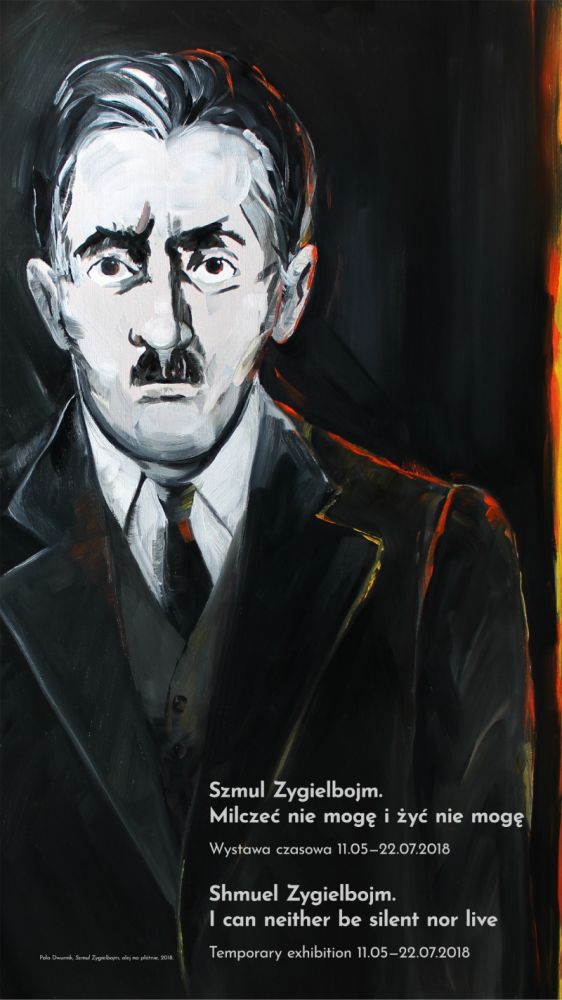- News
- Events
- Oneg Shabbat
- Collections
- Research
- Exhibitions
- Education
- Publishing Department
- Genealogy
- About the Institute
- Bookstore


Shmuel Zygielbojm objected to social injustice and to a separate status of Jews as Polish citizens. He thought of himself as a representative of the underprivileged Jewish people – men, women, the elderly and the children. In one of his short stories written before World War II, Zygielbojm wrote: The Vistula river speaks to me in Jewish. He strongly believed that the Bundist principle of doykayt — “here and now”, should be a direction for the entire Jewish community in Poland. This belief wasn’t shaken even by a rising wave of anti-Semitism in the interwar period. Quite the contrary: facing acts of anti-Jewish violence, he reinforced his dedication to the cause of solidarity in a struggle for equality and democracy.
As a member of the London-based National Council of Poland, Zygielbojm was alarming the world about the tragic fate of Polish Jews under German occupation. Even though he didn’t witness the Holocaust himself, he was one of few people at the time to understand that Shoah was an unprecedented event in history. Isolation he felt in his struggle led him to suicide.
In the letter to President Władysław Raczkiewicz and to Prime Minister Władysław Sikorski he wrote:
[…] I can neither be silent nor live when the last remnants of the Jewish people, whose I represent, are being killed. My comrades in the Warsaw Ghetto have fallen with guns in their hands, in their last heroic struggle. I wasn’t given the chance to die like them, together with them. But I belong with them, in their mass graves.
Through my death, I wish to express my deepest protest against inaction with which the world is watching and permitting destruction of the Jewish people. I am aware how little human life means, especially now. But since I couldn’t achieve it in my lifetime, perhaps my death will shake from lethargy those who can and who should act now, in order to save, in the last possible moment, this handful of Polish Jews who still remain alive.
My life belongs to the Jewish people in Poland, so I give it to them. I wish for that handful which remained from a several-million community of Polish Jews to see the liberation together with the Polish people, to breathe in a world of socialist freedom and justice, to compensate for all their inhuman suffering. I believe such Poland will emerge, and that such a world will come.
I believe that the President and the Prime Minister will pass my words to everyone to whom they are addressed, and that the Polish Government will take diplomatic and propaganda steps to save the last remaining Polish Jews from destruction.
I bid farewell to everyone and everything I held dear and loved.
S. Zygielbojm
His decision cannot be explained. One can at best try to name its various dimensions. A sense of guilt in the face of death of people he loved more than his own life. Defiance against the indifference of the world and reactions of politicians, which didn’t go beyond declarations of good will. The last attempt to move the conscience of the free world. And, last but not least, a refusal to remain helpless, similar to the impulse which led the Warsaw Ghetto fighters to seek their own death with guns in their hands.
Bund – the first part of the exhibition – presents Zygielbojm’s prewar biography on the background of his union, political and local government activity.
The next part tells the story of Zygielbojm’s family relations; having escaped from Warsaw in January 1940, he left his wife and children in the capital. He realized he wouldn’t see them ever again. The only document remaining from three-year period of separation are letters exchanged between Zygielbojm and his family. Unfortunately, his answers didn’t survive. Most likely, they were burned during the Warsaw Ghetto Uprising. The third part of the exihibition is dedicated to World War II. Timeline tells about events from it beginning, through Szmul Zygielbojm’s escape to the West until his inclusion into the National Council and his arrival in London.
The central part of the exhibition is dedicated to the Warsaw Ghetto Uprising and Zygielbojm’s reaction to the struggle of Jewish insurgents.
Visual artist Pola Dwurnik, invited by us to cooperate on the exihibition, painted a portrait of Szmul Zygielbojm.
See an interview with Ilana Slomowit and Aveda Ayalon – Shmuel Zygielbojm’s nieces
The exhibition is organized to commemorate the 75th anniversary of the Warsaw Ghetto Uprising and Szmul Zygielbojm’s suicidal death.
Curator: Zuzanna Benesz-Goldfinger
Scientific consultation: dr Michał Trębacz
Cooperation: Justyna Majewska, dr Krzysztof Świrek
Exhibition designers: Tatemono: Piotr Antonów, Anna Pydo, Justyna Szadkowska, Franciszek Zakrzewski
The exhibition is free of charge.
At the exhibition, we will present photographs, documents and their facsimiles sourced from the collections of: The Polish Institute nad Museum in London, The Polish Underground Movement Study Trust in London, Archive of the YIVO Institute for Jewish Research in New York, Archive of the United States Holocaust Memorial Museum in Washington, National Library in Warsaw, State Archive in Łódź, State Archive in Lublin, Archive of the National Remembrance Institute and the Emanuel Ringelblum Jewish Historical Institute.
Co-financed from the funds of the Ministry of Culture and National Heritage.
![MKiDN_logoeng.jpg [90.00 KB]](https://www.jhi.pl/storage/image/core_files/2020/10/8/ba54cfa7fde05feddcb693c8b0ae4361/jpg/jhi/preview/MKiDN_logoeng.jpg)
Honorary patronage: Mayor of the Śródmieście District Krzysztof Czubaszek and Mayor of the Wola District Krzysztof Strzałkowski
Partners: The National Digital Archives, YIVO Institute for Jewish Research, Tygodnik Powszechny
Media partners: Chidusz, dzieje.pl, Jewish.pl, Midrasz